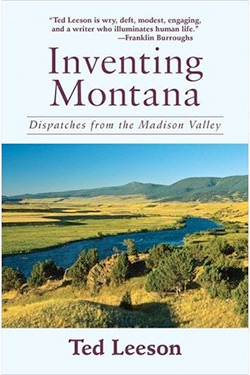Inventing Montana: Dispatches from the Madison Valley
by Ted Leeson
reviewed by Henry Hughes
Ted Leeson makes the disclaimer that he is just a “seasonal resident” who for over twenty years has spent several weeks every summer living above and fishing the Madison River in southwest Montana. “And if my familiarity with the place runs only skin-deep, I am satisfied, for it is our skins that wrap us in sensation.” Leeson’s distance, humility, acute sensitivity and tail-flipping wit make Inventing Montana a fresh, humorous, and insightful book on a region that is reverently fished, camped, explored, and over-described. “Montana” is, after all, just “a word that closes distances, a name for a curved roof of sky and a place fashioned beneath it.”
Drawn from gatherings among old friends at a rented ranch house replete with “good humor, interesting conversation, a 64-quart marine cooler refreshed daily with beer and ice, and an abundance of recreational cooks enthusiastically undeterred by their own extreme amateurism,” the book is as relaxing as it is stimulating. Whether it’s cooking (though strangely they never cook and eat a single trout), mapping the stars, or identifying rocks and birds, the “tradition of the amateur—that is ‘one who loves’ a chosen pursuit,” told with Leeson’s playful self-deprecation, keeps most of the prose from turning pedantic or precious. This ability to love and practice a subject without having to master it, or at least never admitting mastery, is Leeson’s game. It allows for both the mockery and serious manipulation of cultural theory, sociology, and psychology in describing the workings of the summer group, the small town of Ennis, local river guides and business folk, as well as the larger human connections to land and water, recreation and leisure, and, of course, fly fishing.
In a memorable paragraph describing a fishing guide’s “tight-lipped visage weathered to the aspect of a crocodile purse” and his clients, “fly rods waving, like some surreal floating Kabuki,” Leeson marks their drifting past in “silent earnestness, as though something of dreadful importance depends on it, and a palpable intensity radiates from the boat like a force field.” To the author’s delight, the tension is punctured “by a flotilla of little kids from town who come bobbing into sight on fluorescent inflatable horsies, giggling past the boat.”
Although a laureled master of angling, especially fly fishing, Leeson rejects the ecclesiastical dogma of the faith, telling us “fishing is now at heart a form of play” that “cannot be called . . . an ‘art.’ It is only a medium.” This runs counter to the storied tradition—from Izaak Walton to Norman Maclean—in which angling is venerated as both an art and religion that must be properly practiced and protected. Put simply, Leeson loves to fish, but doesn’t take himself or his fishing too seriously. “Any enterprise centered on angling automatically forfeits any pretense to seriousness in the ordinary world.”
But remember that this comes from an author of a dozen good books on the subject. Like Chekhov, who obsessed over fishing yet found it absurd, Leeson is constantly working through a kind of magnetic paradox in regards to the play and seriousness of fishing. And he can be quite severe in his criticism of seriousness. In Thoreauvian tones he disparages modern angling’s “priesthood of experts” and televised tournament fishing: “We appear determined to sanction or dignify play by formalizing it, infusing it with the principles of the marketplace, and bringing to it the same kinds of metrics . . . from the rubrics that measure job performance to the data-collection software that monitors your Internet clicks.” As a writing teacher at Oregon State University, Leeson may also have in mind the joys of teaching and learning as they are subjected to increasing governmental and administrative demands for summative assessments.
Leeson’s first book on fishing and life, The Habit of Rivers (1994), is now considered a masterpiece in a genre that stars great writers like Thomas McGuane. There is something lean and singularly driven about The Habit of Rivers, those rainy reflections of one man fishing across Oregon, that still mark it as Leeson’s best work. Inventing Montana gives us the voice of an older man with more wind in his sails—good relationships with his wife and friends, a shared summer house, and a lot to say about a variety of subjects. There is both a mature wisdom and a playful spirit delivered in Inventing Montana that is not unlike the brilliant ramblings of Melville’s Ishmael.
But every now and then Leeson gets snagged on matters like driving manners, fly selection and fly tying and questions such as “What is your favorite place to fish?” In the last case the author takes several pages to examine the dimensions of the question, only to find that “any conception about a favorite place to fish cannot be separated from an idea of why you fish to begin with.” Perhaps the long meander toward a productive spot was the very point, but it sure was slow fishing. Nonetheless, for the few dull stretches of river, there are many more rewarding rises and eddies, crystallized by mirthful questions, including one asked in response to finding the only available camp space in Yellowstone. “Can an ice scraper be used to secure a campsite?”
Inventing Montana explores and understands the world through a place in our lives, however seasonal or symbolically tenuous. A vast and beautiful Montana—and all the people connected to it—is best expressed not in theories of place but rather in the sheer delight of experience and language we bring to it. Leeson’s creative play, mature intelligence, poetic sensibility, and reasonable control make his invention another great discovery.
Published on March 18, 2013

